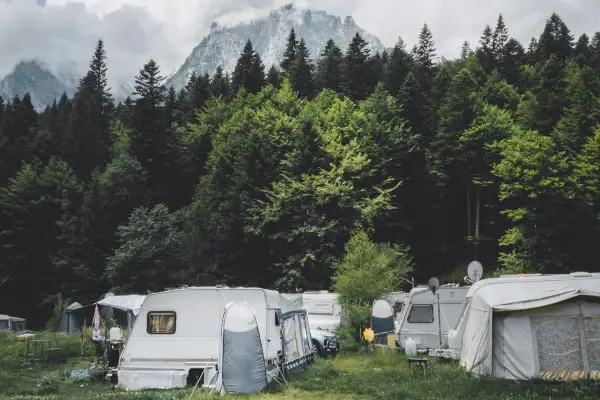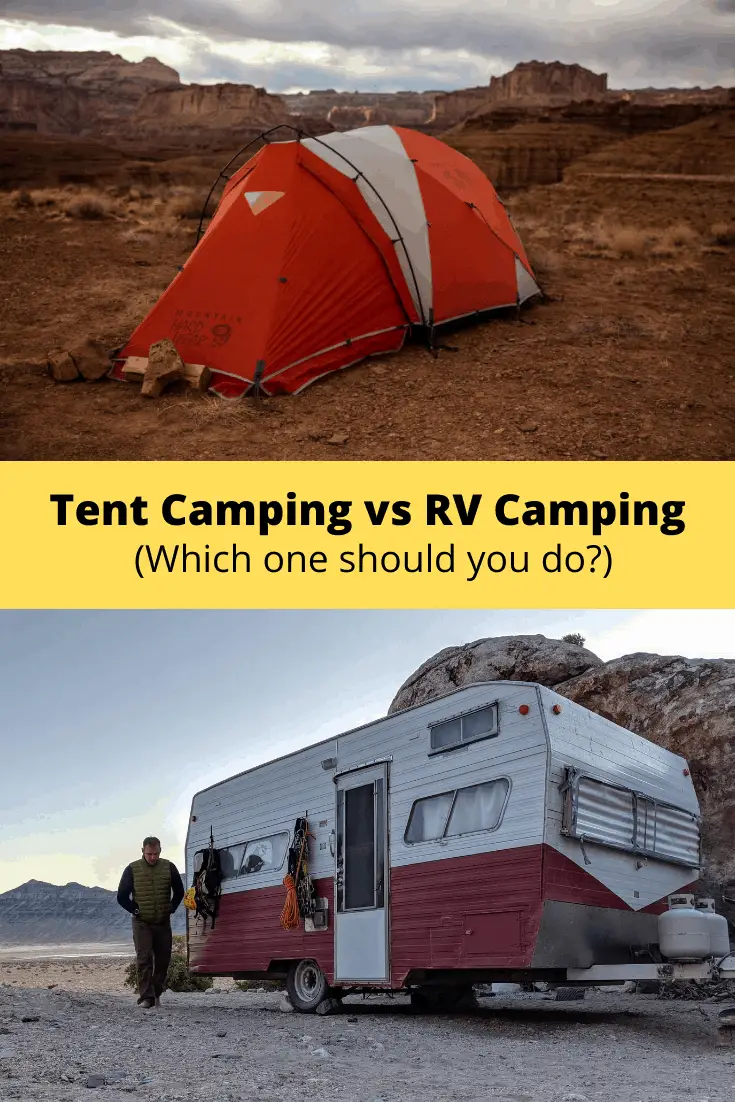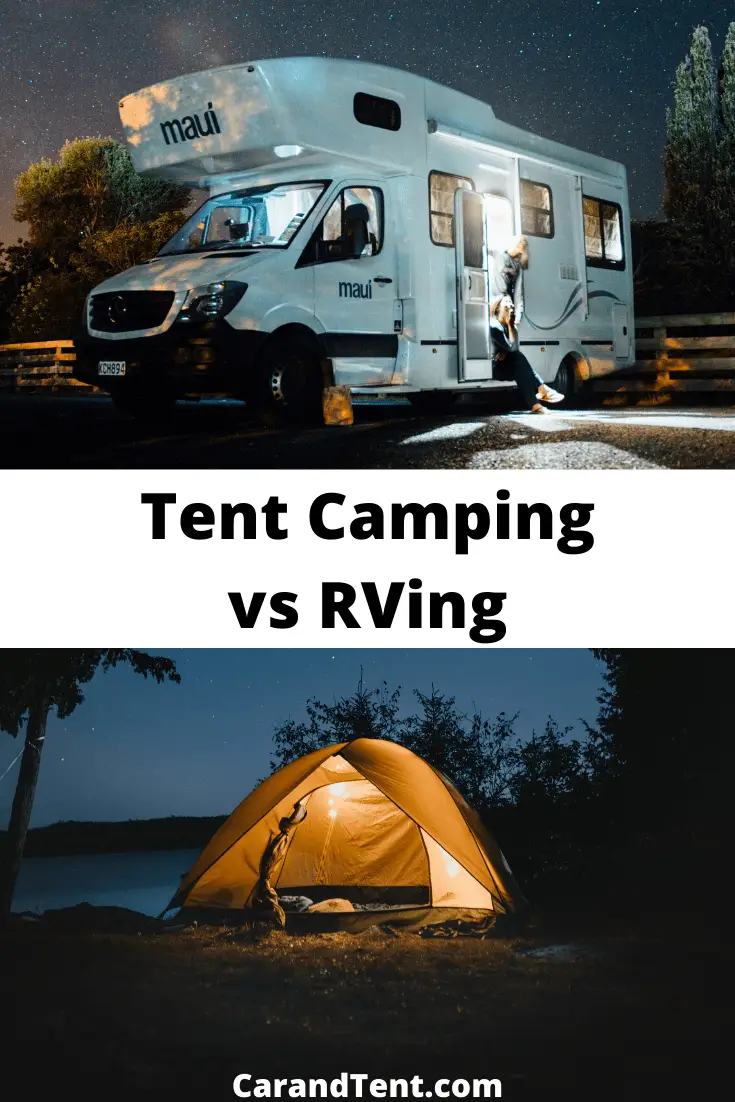
The number of camping options today seem almost limitless. You can camp in a tent, a travel trailer, a motorhome, or even a van.
Camping trips are great regardless of how you go about them. But what’s better for you, tent camping or RV camping.
In this post, I’ll help you decide.
Table of Contents
7 Reasons to Go Tent Camping Instead of RV Camping
Tent camping is a lot of fun and it brings many advantages to the table. In fact, industry studies have found that 77% of people who camp, do so in tents.
Here are the top 7 reasons you might want to choose tent camping over RV camping.
Tent Camping is Less Expensive
You can buy a large tent, camp chairs, and a cooler for the same price you’d expect to pay for a monthly payment on an RV. Even if you rent the RV for a weekend, you’ll still probably spend more money doing that then you’ll pay to buy all of your camping gear.
Once you try to reserve a campsite, you’ll find that the cost of reserving an RV site is often more expensive than reserving a tent site.
On top of all of this, you won’t have to pay for insurance on your tent and you won’t have to spend much money maintaining your tent either. Think you’ll avoid these costs by renting your RV instead?
Think again.
When you rent an RV, you’ll probably have to pay for insurance and you’ll have to bring it back clean. This might mean stopping at a car wash facility and spending money there as well.
Tents can be purchased cheap and they can be rented even cheaper. They last a long time and you don’t have to pay to store them anywhere either.
Tents are Easier to Setup
Setting a tent up is easy. This is especially true of the instant tents that many people bring car camping with them.
Once the tent is up, it’s just a matter of tossing in some creature comforts and zipping the tent doors back up.
The process isn’t always as simple with an RV.
To begin with, an RV needs to be leveled from front to back and from left to right. This process alone can be quite frustrating to many RVers.
After the RV is leveled, electricity has to be set up, water lines have to be connected, and sewer lines need to be connected. If these amenities aren’t available, then you’ll end up having to set up a generator and empty a black water tank when you’re trip is over.
Combine all of these steps and you have a tedious process that you have to follow each and every time you set up and take down your RV. Depending on how quickly your black water tank fills up, you may have to do this multiple times just to stay camped at the same campsite.
A Tent Offers More Backcountry Versatility
Unless you’re sporting an Earth Roamer, a Sportsmobile, or some other off-road RV, you’re not going to get very far into the backcountry. Even if you do have such a vehicle, you still aren’t going to be able to go everywhere that you can with a tent.
A million-dollar Earth Roamer might be extremely capable, but it isn’t going to drive through a dense forest or up onto a mountain.
Tent campers have the option of taking their tent into any wilderness areas that they can handle. They can hike up a mountain and camp at the top, they can spend the weekend camping on the beach, and they can head out into dense forests for some wilderness camping.
Tent Campers Have an Easier Drive
Instagram and Pinterest would have us all believing in the romantic notion that driving a motorhome or pulling a camper provides the ultimate freedom. The pictures scream, “the road is yours, and the world is there for the taking”.
Unfortunately, the reality of it is that RVs are a pain to drive.
Getting onto highways can be challenging, parking can be difficult, and there are some bridges and tunnels that RVs won’t even fit in. Fail to learn the ins and outs of driving a motorhome or towing a camper and you could find yourself in a terrible crash.
Also, you may not even be able to drive your RV without first getting a special license. Obtaining the license could end up being costly and time-consuming.
You don’t have any of these problems when you toss a tent into the back of your daily driver.
Tents Require Less Maintenance Than RVs
A tent needs to be cleaned and it may need to be waterproofed and even patched sometimes. These maintenance steps don’t take long, they don’t cost much, and they don’t have to be done very often.
Fail to do them and the worst that could happen is that your tent fills up with mold and you have to spend a few hundred dollars to replace it. This is extremely rare though and I’ve never had it happen to me personally.
For tips on cleaning a tent, follow the link below.
Compared to tents, RVs are maintenance traps. With a travel trailer, you’ll have to take care of the tires, the brakes, and everything inside.
You’ll also have to clean the trailer and you’ll have to regularly check for leaks. Even a small leak can completely ruin your RV in just one season.
If you have a motorhome, the maintenance is even more intense. This is because you’ll have all of the added frustrations that come with maintaining a motor vehicle.
Tent Camping Has a Very Short Learning Curve
Before you can go camping in an RV, you have to learn how to drive it or tow it safely. You’ll also have to learn how to fill and empty the freshwater and wastewater tanks.
You’ll need to learn how to operate the gas, the electricity, and the leveling systems. These steps aren’t always intuitive and you could have some trouble the first few times you go camping.
Tents, on the other hand, are pretty easy to set up. This is especially true of the newer instant tents which require almost zero effort to set up at all.
You Can Bring More People With You
RVs are usually pretty good at maximizing sleeping space but at the end of the day, you’ll only be able to take a limited number of people. With tent camping, it’s easy to add people to your trip.
You can easily buy a larger tent, buy a few extra tents, or simply have your friends bring their own tent.
7 Reasons to Go RV Camping Instead of Tent Camping
While there are more people tent camping than RV camping, this doesn’t mean that RV camping is without its advantages. In fact, there are many great reasons to go RV camping instead of tent camping.
Here are the top 7 reasons to go RV camping.
RVs are More Comfortable
It’s no secret that an RV is going to be more comfortable than a tent. In most cases, you’ll have climate control, plumbing, and cooking facilities.
You’ll also have a comfortable place to eat and you may even have a spacious living room to hang out in. While the smaller RVs might not offer these things, at the very least, you’ll have a comfortable bed to sleep in.
Noise won’t be as much of an issue in an RV either. Many people overlook this advantage that RVs have over tents but it really is a big one.
This is especially true when you end up next to a loud neighbor. When you’re in a tent, you’ll hear every noise.
These noises won’t always be the peaceful sounds of nature. They could be coming from some dude with a guitar.

Other noises might include late-night calls from the animals in the forest or belligerent rants from the drunk guy next door.
Don’t believe me?
Consider how many camping websites suggest bringing earplugs with you when you camp.
If you have pets, they’ll also be more comfortable as well. In some areas, you may not even be able to go camping with your cat or dog without an RV to house them in.
RVs Offer More Urban Camping Options
Walmarts and Cracker Barrels can make great temporary campsites while you’re on your way to some faraway place. This is because most of them won’t have a problem with you parking in their parking lots overnight. They will, however, have a problem with you pitching a tent in their parking lot.
Even if they didn’t, it wouldn’t be a good idea to do so. A tent could easily get run over and you wouldn’t have any solid walls to keep you safe while you slept.
On top of this, you’d face the noise situation again. A campsite may or may not be loud but a parking lot will almost certainly be loud.
An RV even gives you the chance to stealth camp in urban areas. Park your vehicle on a street after dark and leave the lights out and you probably won’t be bothered.
Set up a tent on the street and you’re sure to be harassed. In some areas, it will be by police officers and concerned neighbors. In other areas, it will be by people trying to harm you.
Here is a link to a sad story of a man I used to drive by regularly when I lived in Philadelphia.
It’s Easier to Meet Medical Needs in an RV
People with medical needs will also have an easier time camping in an RV. Insulin can be stored in the fridge, CPAP machines can be hooked up to the RVs power supply and bathrooms are located onboard.
A person with bad asthma might be better off in an RV as well. Once night rolls in and people begin to light their fires, they can head inside their RV where they can take advantage of their air filters and climate control systems.
Less Packing is Required
A car camper looking to have a comfortable tent camping trip will usually bring along camping chairs, a camping cot or mattress, tables, lanterns, and fans.
These all have to be packed into their car and then packed into the tent when they arrive. When it’s all said and done, they’ll have packed everything up at least four times.
RV campers don’t have this problem. Everything they need to be comfortable already lives inside of their RV.
RVs Offer More Protection Than Tents
It isn’t possible to lock a tent up when you go out hiking or kayaking for the day. As a result, you end up having to lock all of your valuables in your car each time you head out.
On top of this, you don’t have any additional safety when you’re in your tent either. While attacks on people in campgrounds are incredibly rare, it is possible and a tent wall isn’t even going to slow an intruder down.
People and animals aren’t the only threats you might face at a campsite. A large rock or tree branch could also come crashing down on you. An RV won’t stop a tree or boulder from crushing you but it will be able to handle the smaller branches much easier than a tent will.
Food Storage May Be Easier
In many areas, RV campers are perfectly safe in leaving their food inside of their hard-side RV. This means they don’t have to worry about bringing bear bags or canisters and they don’t have to worry about hanging them in bear lockers or in trees.
Want a late-night snack while camping?
If you’re in an RV, this isn’t a problem at all. If you’re tent camping, you’ll have to climb out of your tent, open up your bear locker and then put everything back once more.
RVs Are More Appealing to Non-campers
I love camping but I fully understand that there are many people who don’t. It could be because they’ve tried it and didn’t like it or it could be that they haven’t tried it and assume it’ll be uncomfortable.
Either way, it’s a lot easier to convince somebody who doesn’t like camping to go with you if they know they’ll be sleeping in an RV versus a tent.
Final Thoughts
RVs and tents both have many plusses and minuses to consider and they each excel in different areas. But like I said in the beginning of this post, you really can’t go wrong with doing either.



